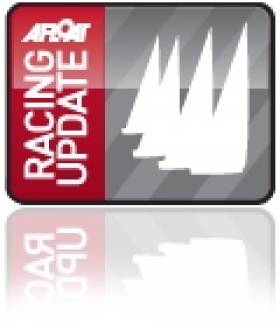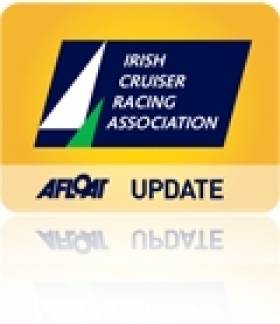Displaying items by tag: ISORA
ISORA J109s Continue Offshore Domination
#ISORA – J109 yachts continue to show their prowess offshore taking three of the top four places in ISORA's second race from Dun Laoghaire to Holyhead on Saturday. Preliminary results have been revised and the latest overall results are attached below for download as an excel file.
Welsh J109 Sgrech bested a fleet of 16 and although the three J boats competing crossed the line one after the other, the two Dun Laoghaire Js, Joker 2 and Jedi, who shared the first race prizes last weekend, could not catch Sgrech.
Four boats including the JOD 35 double-hander Dinah campaigned by Ostar skipper Barry Hurley retired in the 60-mile race across the Irish Sea.
National Yacht Club Race Officer Larry Power, sent the fleet beating towards the M2 buoy in a 15-20 knot north easterly wind. The tide at the start was flooding pushing the fleet up towards the M2 but constantly shifting winds, both in direction and strength, made rounding the M2 weather buoy difficult.
First around the M2 was "English Mick" followed by "Sgrech". This order remained to the finish line in Holyhead. While the last leg was a fetch, the approach into Holyhead was tricky with strong tides. Boats that went south with the ebbing tide after the M2 were rewarded with being swept into Holyhead Bay by the following flood tide.
The next ISORA race is the 100–mile Round Ireland qualifier from Conwy to Howth on the 19th May.
#ISORA – Both of the top J109 performers from last weekend's opening offshore race of the season are entered into tomorrow's second ISORA race of the season.
The race starts from Dun Laoghaire at 8am on Saturday and heads across the Irish sea to Holyhead via the M2 weather buoy.
Last weekend's winner Joker II skippered by John Maybury as well as runner up Andrew Sarratt's Jedi are competing in the 19-boat fleet.
The 60-mile race is held under the burgee of the National Yacht Club. Sailing instructions and an entry list are available for download below.
#SAILING NEWS – Stormy weather continues to frustrate early season sailing schedules. Wind and waves that produced spectacular trawler photos off Howth last week abated sufficiently to get Saturday morning's first ISORA race away and on Dublin Bay the second race of the Saturday afternoon series took place in excellent surfing conditions.
The strong winds have returned this morning though leaving anyone planning a trip across the Irish sea, be they coastal rowers, tall ships or dinghy experts, with a reminder about how rough things can get. From San Francisco, a survivor of the yachting tragedy there has spoken out about the need for tethering.
Yesterday afternoon the first race of the revised SB3 season on Dublin Bay was scrubbed and in other small craft news the Fireball class held its annual training clinic. Royal Cork Optimists are heading for Waterford in a strong position. A Portrush man is heading to Spain to defend his kayaking title and in rowing news Monika Dukarska came out on top after a battle with Afloat's Rower of the Year Holly Nixon.
And is adventure sailing a new tack for declining dinghy numbers?
All this and lots more on Afloat's home page this morning!
J109 Yachts Revel in Strong Wind ISORA Race to Arklow
#OFFSHORE – The stable, easy to sail and performance attributes of the J109 came to the fore in a blustery start to the ISORA season on Saturday, the Rod Johnstone design taking the top two places overall in the 18-boat fleet. Photos from yesterday's start below plus full results in pdf format for download.
Racing in between gale forecasts the first race of the season from Dublin Bay to North Arklow and back was won by top DBSC performer John Maybury's J109 from the Royal Irish Yacht Club. Joker 2 beat 36–foot sistership Jedi skippered by offshore campaigner Andrew Saratt by a three minute corrected time margin.
Despite strong north-easterly winds, 18 boats (and a good cross section of sailing cruisers some drawn from the ranks of the local bay fleet), came to the Scotsman's bay start line from an entry list of 23 at 10.00am. The conditions were not as bad as last Tuesday when even trawlers found the going tough on the east coast but there was nevertheless a good sea running.
The 42–mile course took the fleet around South Burford and against the tide to North India. In the very lumpy seas around Codling Bank the fleet beat out to East Codling before turning to the finish.
Absent from the first race was Irish Sea champion Matt Davis' Sigma 400 Raging Bull. The 'Bull' is the ISORA Champion for 2010 and 2011 but was damaged last week during the north-easterly storms when moorings failed in Skerries in big seas and the yacht was blown onto rocks. Davis is hoping to get the boat repaired and to defend his title.
The second ISORA race is on Saturday 5th May, the 60–mile Round Ireland Yacht Race qualifier race from Dun Laoghaire to Holyhead where some some new additions to the ISORA fleet are expected into the race.

Run in conjunction with the Royal Alfred Yacht Club racing was started by RAYC Commodore, Barry MacNeaney

Irish Offshore Sailing's Desert Star was the winner of the Silver fleet
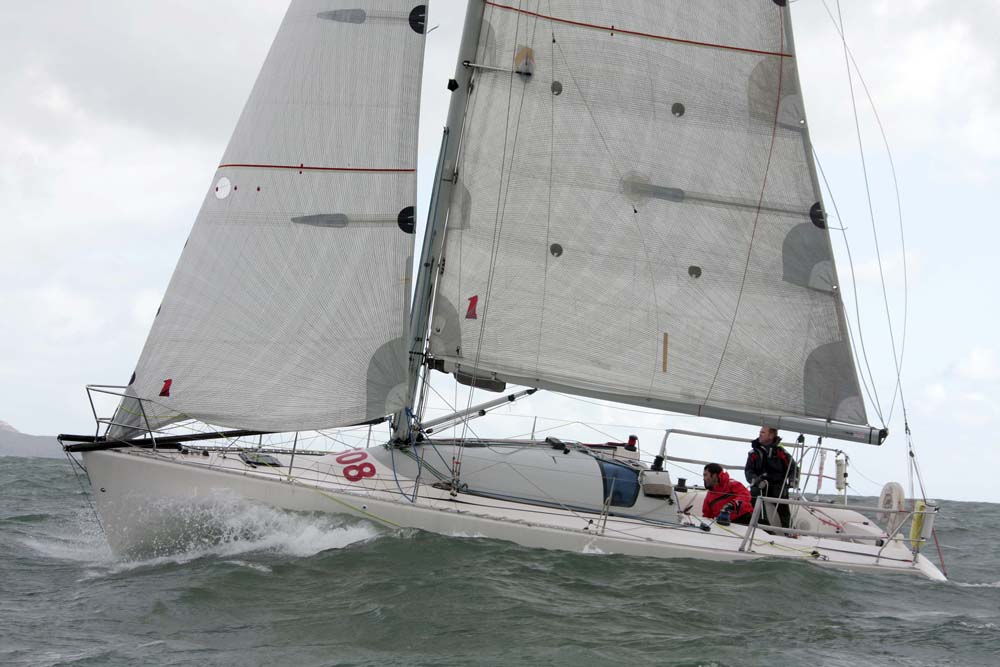
Dinah, Barry Hurley's double-handed Jeanneau was third in the race from Dun Laoghaire to Arklow
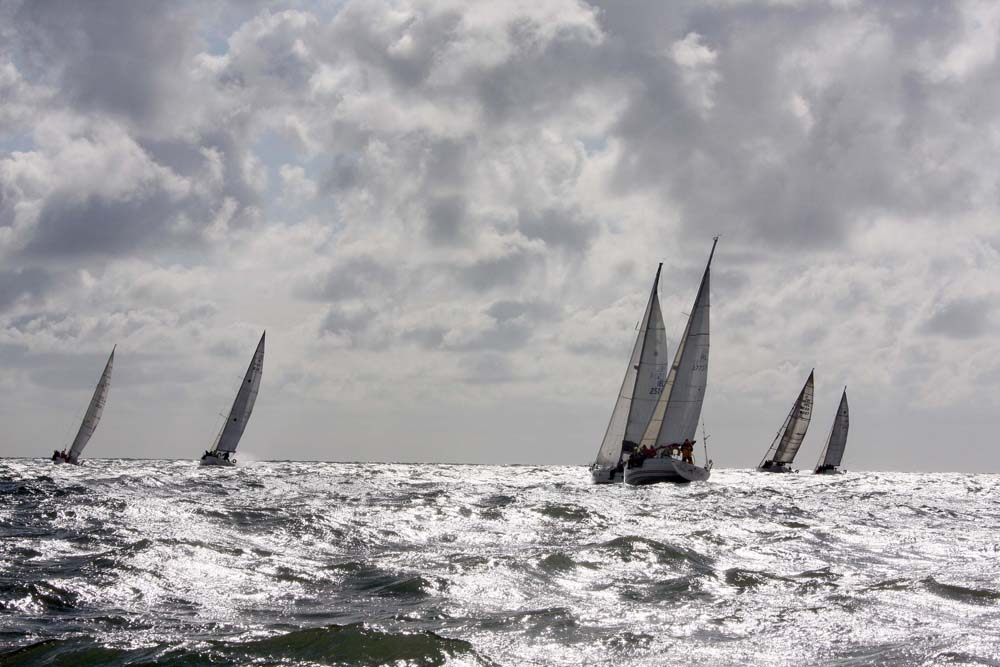
Big seas on the way to Arklow for 18 yachts competing in the first ISORA of the season. More ISORA fleet photos below.
#OFFSHORE – Storm damage means defending ISORA champion yacht Raging Bull, skippered by Matt Davis, from Skerries will not be on the start line off Dun Laoghaire tomorrow for the first ISORA race of the season.
According to locals the yacht broke its moorings when north easterly winds battered the east coast. The yacht was among others to be washed ashore in Skerries in north Dublin.
It is less than a week since the boats were craned in at Skerries Sailing Club. Below a photo of the conditions that led to yachts breaking moorings at the East coast port.
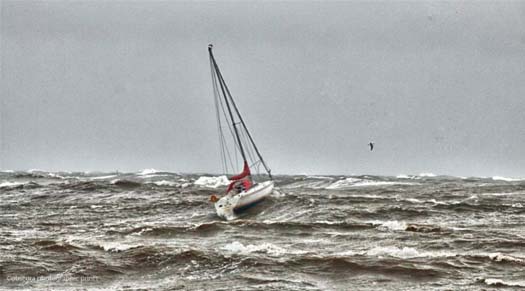
Riding the waves on moorings in Skerries Photo: Obscura Photography. For more shots of 'Stormy Skerries' on April 25th see the Obscura facebook page here.
The latest update on the situation comes from Des Fitz on Afloat's facebook page that 'skipper Matt Davis is hopeful to repair damage and try to compete in the end of the ISORA series'.
As the video above shows the 2010 and 2011 ISORA championship winning Sigma 400 was left on its side on the Skerries beach but it appears efforts to save the hull and rig were successful with the boat lifted by crane on to a truck and taken away for repair. Sad news for Matt and crew and all involved.
A video depicting the recovery of Raging Bull that was published on Vimeo is now a private view only
#OFFSHORE – 18 boats are expected on the line tomorrow morning for the start of the first ISORA offshore sailing race of the 2012 programme.
A split for Class 1 and Class 2 will be made but not until the morning and is subject to final entries.
15-20 knots of wind from the north east is expected and the above course is proposed.
The tide will be flooding for most of the race and as the fleet will most liklely avoid Wicklow Head in such circumstances the plan is to round North India instead of North Arklow buoy.
The course is 47 miles long, a route that should give two beats and loads of reaching and runs and return most boats to ISORA HQ at the National YC for results and a 'dry sherry' for 6pm.
Confirmation of the course will be given at the briefing on Saturday at 08.45 at Dun Laoghaire marina. It will also be broadcast on VHF Ch72 soon after. Boats are expected to return to Dun Laoghaire by 6pm.
#OFFSHORE – As the days get longer thoughts are turning to offshore sailing again and as Irish Sea Offshore Racing Association (ISORA) Commodore Peter Ryan writes 2012 promises to be a great year not just because it is Round Ireland year but because there are new and exciting things happening in ISORA.
We will be visiting Conwy and Keith Manders has already arranged a great social event on the Friday evening. We will be using the "virtual marks" that will ensure that there is a "corner" in every race. The schedule provides for feeder races to the ICRA Championships in Howth in May and Abersoch Keelboat Week in August. We will also be providing qualifying races for the Round Ireland.
I attach the Conditions, NoR and Entry Form for 2012. As we will be running a Silver Fleet it would be great to have some idea of likely entries as soon as possible. We are finalising Online Entry using PayPal for ISORA. We hope to have this complete next week. We hope this will make it handier to enter races.
I have now put all the ISORA trophies back into circulation and I hope that we can increase fleet numbers, populate the Sliver Fleet and ensure a better spread of trophies in 2012.
As I did last year, I will be coordinating a Crew Available list again this year. Anyone who does not have a place on a boat should complete the Excel sheet attached, indicating their availability for selected races. I am already aware of crew of all levels of experience who are looking for places on boats.
I hope as many of you as possible take part in ISORA in 2012 . Please do not hesitate to contact me if you have any queries on ISORA. I would also appreciate if you could promote ISORA within your Club – Peter Ryan
ISORA Race Programme 2012
28th April - ISORA / RAYC / Lee Overlay Day Race - (50 miles)
Dun Laoghaire to Nt. Arklow Cardinal
5th May - ISORA Offshore - Dun Laoghaire to Holyhead (60 miles)
Qulaifying Race
19th May - ISORA Offshore - Conwy to Howth (100 miles)
Qulaifying Race
2nd June - ISORA Offshore - Pwllheli to Wicklow (100 miles)
Qulaifying Race
14th July - ISORA Day Race – Pwllheli day race (35 miles)
27th July - ISORA / RAYC / Lee Overlay Night Race - (35 miles)
Dun Laoghaire to Nt. India Qulaifying Race
18th August - ISORA Offshore - (75 miles) Qulaifying Race
Dun Laoghaire – Pwllheli (T.B.C)
1st September - ISORA / RAYC / Lee Overlay Day Race - (54 miles)
Dun Laoghaire to M2
8th September - ISORA Day Race - Pwllheli day race ( 35 miles)
15th September - ISORA Offshore - Pwllheli to Dunlaoghaire. (80 Miles)
James Eadie Race – Qulaifying Race
Overall Series: To win the overall ISORA series for the Wolf's Head Trophy boats must complete 2 of the 6 "Qualifying". Points for the overall series will then be taken from the best 5 results. Prizes will be awarded for a separate series to include all races in the schedule.
N.B. - All races will have a weighting applied.
Howth Plans Big Event for 2012 ICRA Nationals
ICRA – the 2011 Club of the Year – laid out its stall until 2014 at the eighth annual conference in Dun Laoghaire at the weekend and the momentum is already building at Howth Yacht Club (HYC) who stage the 2012 National Championships at the beginning of next season.
The country's biggest yacht club has a potential sponsor in the wings and Saturday's conference also heard from the Club's Norbert Reilly that HYC is adding feeder events around the two day championships from May 25/27 to double the attraction of the North Dublin venue.
The Corby Cup will be sailed the weekend prior to the Nationals (19-20 May) and the Irish sea offshore body, ISORA, will stage a feeder race from Conwy in Wales to Howth. Both initiatives will encourage UK boats to travel to Dublin for the ICRA series.
Typically the ICRA event attracts over 100 boats in four different classes.
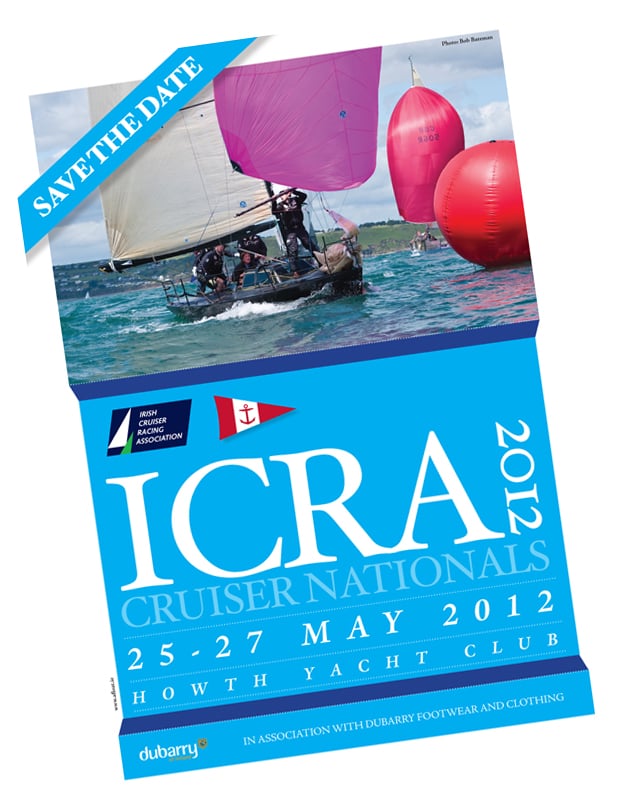
In spite of a dip in the size of the Cruiser fleet in Howth in recent years local boats are still taking some of the big prizes nationally with Reilly's Crazy Horse the 2011 Volvo Dun Laoghaire and DBSC Cruiser Challenge winner and Pat Kelly's J109 Storm picking up the weekend conference's top 'Boat of the Year' prize.
Ashore there are plans to make the event family oriented and a 'ladies lunch' is also planned.
The weekend's ICRA conference decided to do away with the crew limit rule for the seven race series in Howth as the association focuses on getting more crews out on the water to enjoy cruiser racing.
The ICRA Nationals goes West for a return visit to Tralee Bay Sailing Club in June 2013 and in 2014 the National Championships will be staged by the Royal Irish Yacht Club in Dun Laoghaire.
In the normal cycle of things 'the ICRAs' should be heading to the south coast again in 2015 but so far, the conference heard, the association is open to offers.
The 2012 ICRA Notice of Race for the Howth Championships will be available on Afloat.ie shortly
New Race From Conwy Features in 2012 ISORA Calendar
It was agreed that virtual marks would be in fixed positions on a trial basis. ISORA Commodore Peter Ryan believes it will 'revolutionise' offshore racing in the Irish Sea and produce better and more exciting racing.
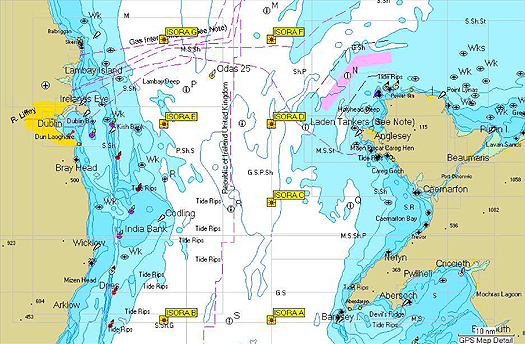
The new ISORA waypoint positions
It was also agreed at the weekend's agm at the National Yacht Club in Dun Laoghaire that there would be two "Restricted / Silver Fleet" classes. The decision of what boats qualify for these classes will be made by the Sailing Committee prior to the first race. It is hoped that this will allow a fairer spread of prizes.
Virtual Waypoints Coordinates:ISORA A N52 45.000 W5 08.000
ISORA B N52 45.000 W5 40.000
ISORA C N53 06.000 W5 08.000
ISORA D N53 20.000 W5 08.000
ISORA E N53 20.000 W5 40.000
ISORA F N53 35.000 W5 08.000
ISORA G N53 35.000 W5 40.000
Preliminary Race Programme 2012
28th April - ISORA / RAYC / Lee Overlay Day Race - (50 miles)
Dun Laoghaire to Nt. Arklow Cardinal
5th May - ISORA Offshore - Dun Laoghaire to Holyhead (60 miles)
Qulaifying Race
19th May - ISORA Offshore - Conwy to Howth (100 miles)
Qulaifying Race
2nd June - ISORA Offshore - Pwllheli to Wicklow (100 miles)
Qulaifying Race
27th July - ISORA / RAYC / Lee Overlay Night Race - (35 miles)
Dun Laoghaire to Nt. India Qulaifying Race
18th August - ISORA Offshore - (75 miles) Qulaifying Race
Dun Laoghaire – Pwllheli (T.B.C)
1st September - ISORA / RAYC / Lee Overlay Day Race - (54 miles)
Dun Laoghaire to M2
8th September - ISORA Offshore - Pwllheli to Howth. (80 Miles)
James Eadie Race – Qulaifying Race
Overall Series: To win the overall ISORA series for the Wolf's Head Trophy boats must complete 2
of the 6 "Qualifying". Points for the overall series will then be taken from the best 5
results. Prizes will be awarded for a separate series to include all races in the
schedule.
All races will have a weighting applied.
There will be two Day Races starting and finishing in Pwllheli – dates TBC.
ISORA 2012 Looking at Trackers and 'Virtual' Marks
The moves come as the offshore body goes from strength to strength on the Irish Sea, recruiting more boats to venture out of Dublin Bay and to try longer distance races. It is a reversal of fortunes for offshore sailing that had been vitally wiped out just a few years ago.
The idea for the new marks sprung from last years' Lyver Race from Liverpool Yacht Club where a virtual mark was successfully used as a mark on the course (i.e. coordinates only).
The problem for ISORA though, with the exception of M2 buoy, is most of the marks used in ISORA raeces are within five to seven miles of the Irish coast and there are no marks off the Welsh coast.
Using virtual marks further off the coast would greatly help in setting courses that are not just long reaching legs. The day races, particularly from Dun Laoghaire could be far more interesting.
One of the problems about using the virtual marks though is the question of "how do you ensure that all boats have rounded the mark?"
The boats in the Lyver race had trackers fitted but ISORA commodore Peter Ryan says his experience of watching several boats round the 'mark' was that they tended to take it 'wide'.
Ryan is looking into the possibility of "obtaining" a set of trackers that could be used for all ISORA races.
Another suggestion is that a photograph could be taken on a mobile phone of the boat's GPS display at the time of the rounding. The photo would then be sent by SMS to the race office as part of the normal finish time declaration.
The feasibility of such a move is just one of the items on the agenda at the association's agm on November 19th at the National Yacht Club in Dun Laoghaire, a highlight of the offshore year.



























